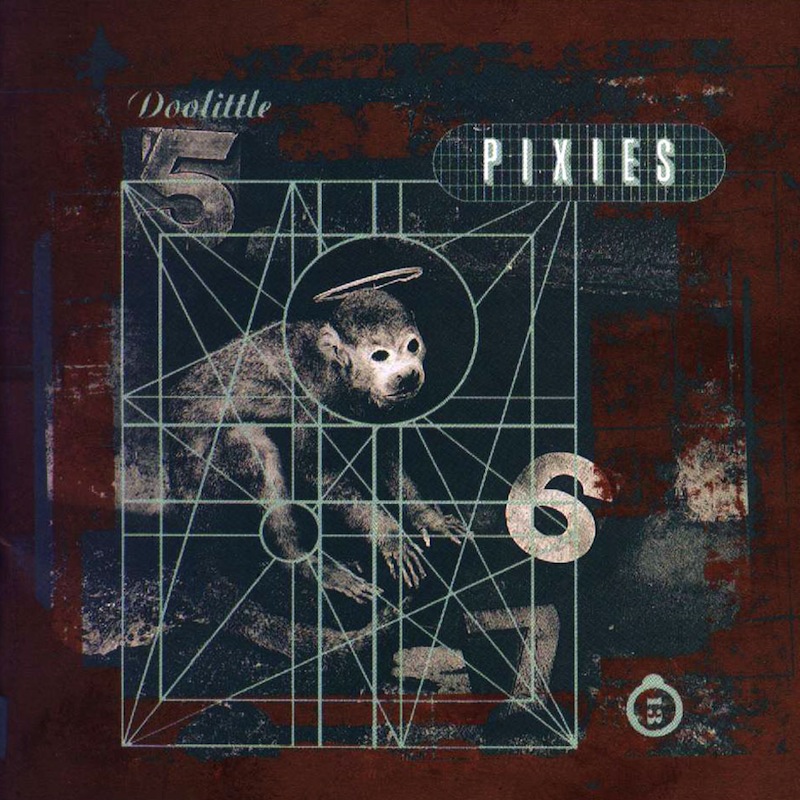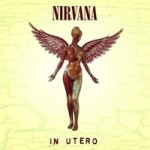Pixies : Doolittle

Given how many Pixies-influenced bands are out there today, it’s easy to forget just how revolutionary the Pixies were around the time they released Doolittle. While fans may split on which is the more monumental album, it or its predecessor, Surfer Rosa, the pairing of aggressive post-punk and surf pop, with hints of Latin influences, made the dominance of Doolittle difficult to argue with. By 1989, the Boston band had garnered a bevy of cult fans, but their sophomore album had broken them somewhat into the mainstream, at least of alternative rock.
In my third year of college I had the fortune of being in a French film class, being able to witness on the big screen the horrific weirdness of the Salvador Dali / Luis Buñuel film, Un Chien Andalou. It is from this short film that the opening song on Doolittle, the popular live classic “Debaser” was inspired. Let me just say this, Black Francis wasn’t kidding around with the line, “Slicin’ up eyeballs,” and if you have a tendency to queasiness, you should probably avoid Un Chien Andalou. The song starts off with Kim Deal’s throbbing bass, and also features her distinctive calm yin voice to Francis’ yang. That guitar frenzied and manically voiced song kicks off the album, which is then taken up another notch with “Tame.” For those introduced to the music of the Pixies through the more pop-friendly tunes such as “Gigantic” and “Here Comes Your Man,” the threatening “Tame” was like a kick in the teeth. It still remains as one of the perfect examples of the Pixies’ reined in, then completely unbridled aggression. To this day, I’m still unsure of which version of “Wave of Mutilation” I’m fonder of, the album version or the slower `U.K. Surf’ version. Either way, it’s one of the Pixies’ signature songs, featuring one of Francis’ pet obsessions, the sea.
“I Bleed” is one of the more shining examples of the juxtaposition of Deal and Francis’ vocal duties. She sings in monotone while he merely talk-sings through the piece. This gives way to the first single from the album, the awfully catchy and infectious “Here Comes Your Man.” Although the music is more accessible than the Pixies’ music has ever been previously, its lyrics are still practically indecipherable, just like most of their songs. “Dead” tells the Biblical story of David and Bathsheba, in which her husband, rather than being left to enemy soldiers, `hits the crapper.’ The second single, “Monkey Gone to Heaven” was just as popular as its predecessor, becoming a massive live favorite as fans shouted out the last verse back to the band with its use of Biblical numerals, reserving “God is seven” for his ultimate rage.
An odd quintet of songs follows in the schizophrenic “Mr. Grieves” (later redone brilliantly a cappella by TV on the Radio), the mile-a-minute “Crackity Jones” which names Fred Flintstone by his Spanish name (Paco Picopiedra), the David Lovering sung “La La Love You,” the Bowie-like “No. 13 Baby” and the intentionally repetitious “There Goes My Gun.” Then comes another fan favorite in “Hey,” finding the Pixies at the top of their post-punk game. Joey Santiago’s guitars are jangly and screaming sonic mastery while Francis and Deal’s voices are exquisitely matched. The song builds, then deconstructs, and then builds itself back up again into a frothing frenzy, much to the delight of the listener. It and “Here Comes Your Man,” despite their cryptic lyrics, are the closest the Pixies have come to a love song.
“Silver” is the one song with writing contribution from Kim Deal. Her later exclusion from the writing process would lead to the band’s demise, but at the time, she was like their George Harrison, a great writer, but underappreciated and underused. Besides “Silver,” she also wrote a b-side for “Here Comes Your Man,” a stunning song called “Into the White.” “Gouge Away” closes out the album in much the way that it began, alternating between measured restraint and punk fury.
Although there are certain standout tracks, Doolittle is one of those albums that is best played all the way through. This is one of the reasons why I have mentioned every track. As a whole, Doolittle is one of the greatest albums ever put together, capturing every side of one of the greatest bands of the ’80s and ’90s. Take a look at the rest of the albums in this Best of the ’80s feature, and you’ll see that there’s really nothing else like it. It stands alone as one of the monumental achievements of alternative music, later cited as a huge influence on the likes of Nirvana. That band later used Surfer Rosa producer Steve Albini to helm their album, In Utero, while Dave Grohl employed Doolittle producer Gil Norton to steer the Foo Fighters’ sophomore album, The Colour and the Shape. Later Pixies albums would feature a few noteworthy songs and would still wend their way into the hearts of their true fans, but nothing shook their world like Doolittle, a dark, odd, violent album of multiple personalities at which you can’t help but smile.
Label: 4AD
Year: 1989
Buy this album at Turntable Lab
Similar Albums:
 Nirvana – In Utero
Nirvana – In Utero
 Dinosaur Jr. – Bug
Dinosaur Jr. – Bug
 Sugar – Copper Blue
Sugar – Copper Blue

